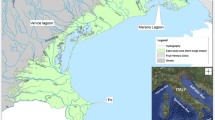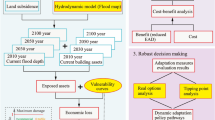Abstract
The development of successful coastal adaptation strategies for both the built and natural environments requires combining scenarios of climate change and socio-economic conditions, and risk assessment. Such planning needs to consider the adaptation costs and residual damages over time that may occur given a range of possible storm conditions for any given sea level rise scenario. Using the metric of the expected value of annual adaptation costs and residual damages, or another metric that can be related to the elevation of flooding, a simplified method to carry this out is presented. The approach relies upon developing damage-flooding depth probability exceedance curves for various scenarios over a given planning period and determining the areas under the curves. While the approach does have limitations, it is less complex to implement than using Monte Carlo simulation approaches and may be more intuitive to decision makers. A case study in Maine, USA is carried out to illustrate the method.







Similar content being viewed by others
References
Colgan C, Merrill S (2008) The effects of climate change on economic activity in Maine: coastal York county case study. Maine Pol Rev 17(2)
Costanza R, d'Arge R, Groot R, Farber S, Grasso M, Hannon B, Limburg K, Naeem S, O'Neill R, Paruelo J, Raskin P, Sutton P, Belt M (1997) The value of the world’s ecosystem services and natural capital. Nature 387:253–260
Groves DG, Lempert RJ (2007) A new analytic method for finding policy-relevant scenarios. Global Environ Chang Hum Pol Dimens 17(1):73–85
Groves D, Lempert R, Knopman D, Berry S (2007) Preparing for an uncertain future climate in inland empire: identifying robust water-management strategies, RAND Corporation, September
Haimes Y, Moser D, Stakhiv E (2002) Risk-based decision making in water resources, Proceedings of the Tenth Conference, American Society of Civil Engineers, 3–8 November, 2002
Hallegatte S, Ranger N, Mestre O, Dumas P, Corfee-Morlot J, Herweijer C, Wood R (2011) Assessing climate change impacts, sea level rise and storm surge risk in port cities: a case study on Copenhagen. Climatic Change (104): 113–137
Hobbs B, Chao P, Venkatesh B (1997) Using decision analysis to include climate change in water resources decision making. Clim Chang 37:177–202
Intergovernmental Panel on Climate Change (IPCC) (2007) In: Parry ML, Canziani OF, Palutikof JP, van der Linden PJ, Hanson CE (eds) Climate change 2007: impacts, adaptation, and vulnerability. Contribution of working group II to the third assessment report of the intergovernmental panel on climate change. Cambridge University Press, Cambridge
Kirshen PH, Knee K, Ruth M (2008) Adaptation to sea level rise in Metro Boston. Clim Chang 90(4):453–473
Merrill S, Yakovleff D, Holman D, Cooper J, Kirshen P (2010) Valuing mitigation strategies, a GIS-based approach for climate adaptation analysis, ArcUser Fall
National Research Council (2007) Mitigating shore erosion along sheltered coasts, committee on mitigating shore erosion along sheltered coasts, ocean studies board, division on earth and life studies. The National Academies Press, Washington
Neumann J, Hudgens D, Herter J, Martinich J (2010a) Assessing sea-level rise impacts: a GIS-based framework and application to Coastal New Jersey. Coast Manag 38(4):433–455
Neumann J, Hudgens D, Herter J, Martinich J (2010b) The economics of adaptation along developed coastlines, Wiley Interdisciplinary Reviews: Climate Change
Nicholls RJ (2004) Coastal flooding and wetland loss in the 21st century: changes under the SRES climate and socio-economic scenarios. Glob Environ Change 14
Ramsdorf S (2007) A semi-empirical approach to projecting future sea level rise. Science 315, January 19
Titus J, Anderson E, Cahoon D, Gesch D, Gill S, Gutierrez B, Thieler ER, Williams SJ (2009) Coastal sensitivity to sea-level rise: a focus on the mid-Atlantic region, synthesis and analysis product 4.1, report by the US climate change science program and the subcommittee on Global Change Research, January
US Army Corps of Engineers (2003) Economic Guidance Memorandum (EGM) 04–01, Generic Depth-Damage Relationships for Residential Structures with Basements, CECW-PG 10 October
U.S. EPA (2009) Synthesis of adaptation options for coastal areas, Washington, DC, U.S. Environmental Protection Agency, Climate Ready Estuaries Program. EPA 430-F-08-024, January
Vogel RM, Shallcross AL (1996) The moving blocks bootstrap versus parametric time series models. Water Resour Res 32(6):1875–1882
Acknowledgements
We have enjoyed working on the application of this methodology with James Neumann, John Herter, and Caroleen Verly of Industrial Economics, Inc., and also appreciate the use of their tools in data analysis. Gary Lamb of Old Orchard Beach and J.T. Lockman of the Southern Maine Regional Planning Commission are acknowledged for their preliminary review of this methodology. The first author also acknowledges the opportunity to explore risk analysis while UCOWR Visiting Scholar at the US Army Corps of Engineers Institute for Water Resources. The paper has been improved by the comments of the anonymous reviewers.
Research described in this paper has been funded by the US Environmental Protection Agency in grant funding provided to the Environmental Finance Center at the University of Southern Maine; however this paper has not been subjected to the Agency’s required peer and policy review and therefore does not necessarily reflect views of the Agency and no official endorsement should be inferred.
Author information
Authors and Affiliations
Corresponding author
Rights and permissions
About this article
Cite this article
Kirshen, P., Merrill, S., Slovinsky, P. et al. Simplified method for scenario-based risk assessment adaptation planning in the coastal zone. Climatic Change 113, 919–931 (2012). https://doi.org/10.1007/s10584-011-0379-z
Received:
Accepted:
Published:
Issue Date:
DOI: https://doi.org/10.1007/s10584-011-0379-z




